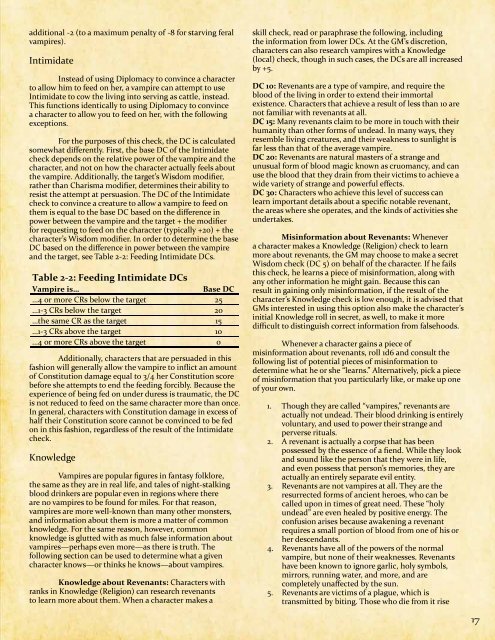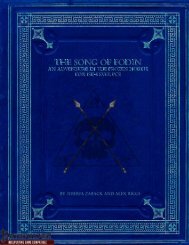Liber Vampyr
Liber Vampyr - Necromancers of the Northwest
Liber Vampyr - Necromancers of the Northwest
- No tags were found...
You also want an ePaper? Increase the reach of your titles
YUMPU automatically turns print PDFs into web optimized ePapers that Google loves.
additional -2 (to a maximum penalty of -8 for starving feral<br />
vampires).<br />
Intimidate<br />
Instead of using Diplomacy to convince a character<br />
to allow him to feed on her, a vampire can attempt to use<br />
Intimidate to cow the living into serving as cattle, instead.<br />
This functions identically to using Diplomacy to convince<br />
a character to allow you to feed on her, with the following<br />
exceptions.<br />
For the purposes of this check, the DC is calculated<br />
somewhat differently. First, the base DC of the Intimidate<br />
check depends on the relative power of the vampire and the<br />
character, and not on how the character actually feels about<br />
the vampire. Additionally, the target’s Wisdom modifier,<br />
rather than Charisma modifier, determines their ability to<br />
resist the attempt at persuasion. The DC of the Intimidate<br />
check to convince a creature to allow a vampire to feed on<br />
them is equal to the base DC based on the difference in<br />
power between the vampire and the target + the modifier<br />
for requesting to feed on the character (typically +20) + the<br />
character’s Wisdom modifier. In order to determine the base<br />
DC based on the difference in power between the vampire<br />
and the target, see Table 2-2: Feeding Intimidate DCs.<br />
Table 2‐2: Feeding Intimidate DCs<br />
Vampire is…<br />
Base DC<br />
…4 or more CRs below the target 25<br />
…1‐3 CRs below the target 20<br />
…the same CR as the target 15<br />
…1‐3 CRs above the target 10<br />
…4 or more CRs above the target 0<br />
Additionally, characters that are persuaded in this<br />
fashion will generally allow the vampire to inflict an amount<br />
of Constitution damage equal to 3/4 her Constitution score<br />
before she attempts to end the feeding forcibly. Because the<br />
experience of being fed on under duress is traumatic, the DC<br />
is not reduced to feed on the same character more than once.<br />
In general, characters with Constitution damage in excess of<br />
half their Constitution score cannot be convinced to be fed<br />
on in this fashion, regardless of the result of the Intimidate<br />
check.<br />
Knowledge<br />
Vampires are popular figures in fantasy folklore,<br />
the same as they are in real life, and tales of night-stalking<br />
blood drinkers are popular even in regions where there<br />
are no vampires to be found for miles. For that reason,<br />
vampires are more well-known than many other monsters,<br />
and information about them is more a matter of common<br />
knowledge. For the same reason, however, common<br />
knowledge is glutted with as much false information about<br />
vampires—perhaps even more—as there is truth. The<br />
following section can be used to determine what a given<br />
character knows—or thinks he knows—about vampires.<br />
Knowledge about Revenants: Characters with<br />
ranks in Knowledge (Religion) can research revenants<br />
to learn more about them. When a character makes a<br />
skill check, read or paraphrase the following, including<br />
the information from lower DCs. At the GM’s discretion,<br />
characters can also research vampires with a Knowledge<br />
(local) check, though in such cases, the DCs are all increased<br />
by +5.<br />
DC 10: Revenants are a type of vampire, and require the<br />
blood of the living in order to extend their immortal<br />
existence. Characters that achieve a result of less than 10 are<br />
not familiar with revenants at all.<br />
DC 15: Many revenants claim to be more in touch with their<br />
humanity than other forms of undead. In many ways, they<br />
resemble living creatures, and their weakness to sunlight is<br />
far less than that of the average vampire.<br />
DC 20: Revenants are natural masters of a strange and<br />
unusual form of blood magic known as cruomancy, and can<br />
use the blood that they drain from their victims to achieve a<br />
wide variety of strange and powerful effects.<br />
DC 30: Characters who achieve this level of success can<br />
learn important details about a specific notable revenant,<br />
the areas where she operates, and the kinds of activities she<br />
undertakes.<br />
Misinformation about Revenants: Whenever<br />
a character makes a Knowledge (Religion) check to learn<br />
more about revenants, the GM may choose to make a secret<br />
Wisdom check (DC 5) on behalf of the character. If he fails<br />
this check, he learns a piece of misinformation, along with<br />
any other information he might gain. Because this can<br />
result in gaining only misinformation, if the result of the<br />
character’s Knowledge check is low enough, it is advised that<br />
GMs interested in using this option also make the character’s<br />
initial Knowledge roll in secret, as well, to make it more<br />
difficult to distinguish correct information from falsehoods.<br />
Whenever a character gains a piece of<br />
misinformation about revenants, roll 1d6 and consult the<br />
following list of potential pieces of misinformation to<br />
determine what he or she “learns.” Alternatively, pick a piece<br />
of misinformation that you particularly like, or make up one<br />
of your own.<br />
1. Though they are called “vampires,” revenants are<br />
actually not undead. Their blood drinking is entirely<br />
voluntary, and used to power their strange and<br />
perverse rituals.<br />
2. A revenant is actually a corpse that has been<br />
possessed by the essence of a fiend. While they look<br />
and sound like the person that they were in life,<br />
and even possess that person’s memories, they are<br />
actually an entirely separate evil entity.<br />
3. Revenants are not vampires at all. They are the<br />
resurrected forms of ancient heroes, who can be<br />
called upon in times of great need. These “holy<br />
undead” are even healed by positive energy. The<br />
confusion arises because awakening a revenant<br />
requires a small portion of blood from one of his or<br />
her descendants.<br />
4. Revenants have all of the powers of the normal<br />
vampire, but none of their weaknesses. Revenants<br />
have been known to ignore garlic, holy symbols,<br />
mirrors, running water, and more, and are<br />
completely unaffected by the sun.<br />
5. Revenants are victims of a plague, which is<br />
transmitted by biting. Those who die from it rise<br />
17



